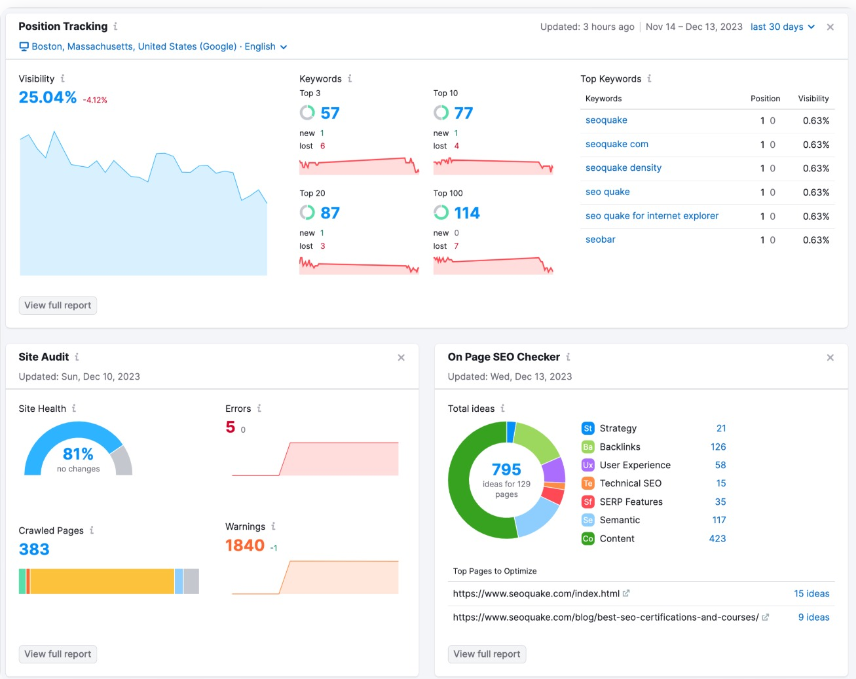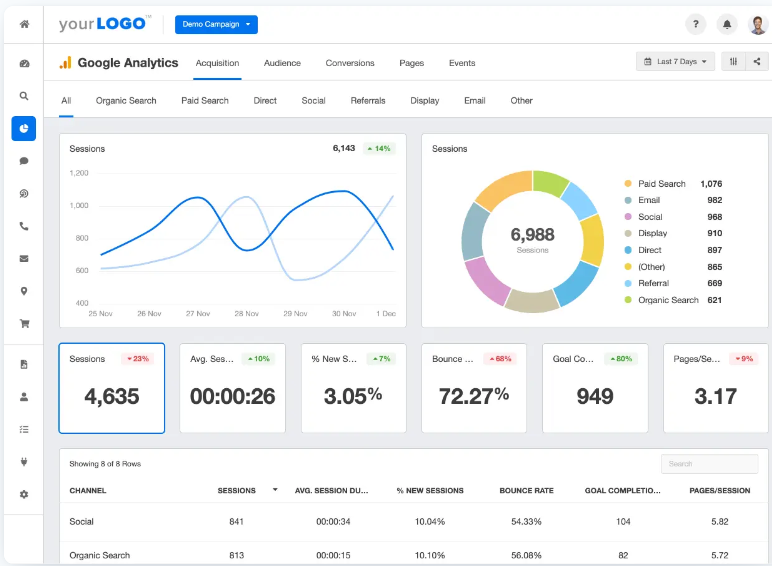This blog post will provide a complete analysis of Semrush vs Google Analytics. We will compare the similarities and differences of the tools so you know how to use each tool to get the most out of your website analysis.
- Understanding Semrush vs Google Analytics
- Comparative Analysis of Semrush vs. Google Analytics
- Combining the Strengths of Both Tools: A Win-Win for Marketers
- Future Trends and Predictions
- Case Study: How Flying V Group Used Semrush and Google Analytics to Help RISE Fertility Become the Top Fertility Clinic In Orange County
- Improve Your Website Performance With Flying V Group And The Right Web Analytics Tools
- FAQs
Understanding Semrush vs Google Analytics
Let’s quickly look at these tools and what they can help achieve.
Semrush

- Renowned for its all-encompassing approach in digital marketing. It essentially represents a one-stop solution that integrates a broad range of functionalities.
- Comprises several main tools: keyword research, site audit, traffic analytics, competitive research, content creation and distribution, and social media management.
- Intuitive user interface with an organized layout that allows easy navigation to its various tools and offerings.
Google Analytics

- Focuses mainly on understanding user behavior and trends through its superior web analytics capabilities.
- Collects a vast volume of data about website traffic and presents this data in user-friendly, customizable reports, offering real-time insights on visitor actions on the site.
- Segments collected data into various categories – user demographics, behavior, conversions, and technology used – offering users the chance to analyze specific aspects of their website performance.
- User-friendly interface suitable for beginners yet advanced enough to satisfy experienced marketers and data analysts.
Comparative Analysis of Semrush vs. Google Analytics
|
Feature/Aspect |
Google Analytics |
|
| SEO Capabilities | Comprehensive SEO toolset including site audit, backlink analysis, and on-page SEO recommendations. | Primarily used for tracking and reporting website traffic, less focus on direct SEO tools. |
| Traffic Analysis | Provides detailed insights into organic and paid traffic, with competitor traffic analysis. | Extensive traffic data analysis, including user behavior, traffic sources, and real-time reporting. |
| Keyword Tracking | Robust keyword research tool with tracking of keyword positions, volume, and difficulty. | Does not directly offer keyword tracking; focuses more on how traffic interacts with existing site content. |
| User Engagement Metrics | Tracks user engagement through metrics like bounce rate, visit duration, and pages per visit on a site level. | Offers in-depth user engagement analysis, including user flow, bounce rates, and interactions per visit. |
| Usability and Learning Curve | User-friendly with a moderate learning curve; more focused on digital marketers. | Steeper learning curve, especially for in-depth analysis, but widely used and supported with numerous resources. |
| Integration Capabilities | Integrates well with other digital marketing tools and platforms, especially for SEO and content marketing tasks. | Strong integration capabilities with Google products and other web tools, offering extensive data import/export features. |
Combining the Strengths of Both Tools: A Win-Win for Marketers
Semrush and Google Analytics, when combined, can provide a comprehensive overview of your digital presence and performance.
By integrating insights gained from Semrush with the user engagement data obtained from Google Analytics, businesses can comprehensively understand their market environment and website performance. This strategy enables them to make data-driven decisions that hone their digital marketing efforts and boost their competitive edge.
However, it’s important to remember that while the combined use of these tools can offer immense benefits, their respective strengths should not be considered in isolation. They are integral components of a holistic digital marketing strategy, each lending their expertise in different but equally essential areas.
Combining the information provided by Semrush’s competitive analysis with Google Analytics’ detailed website data can open doors to a deeper understanding of your brand’s digital landscape and consequently, create more impactful and successful marketing strategies.
Future Trends and Predictions
Marketing tools like Semrush and Google Analytics must continually adapt and innovate to stay relevant.
Semrush is known for constantly adding new features; we expect this to continue. They will likely add more advanced Artificial Intelligence (AI) and Machine Learning (ML) features, giving users better predictions and insights to stay ahead in the market.
Also, as content marketing becomes more important, Semrush will probably improve its content analysis tools to help marketers create content that fits audience interests and follows SEO best practices.
Google Analytics will likely focus more on understanding user behavior, offering clearer insights for businesses. Expect more advanced features for categorizing user data and real-time reports to help businesses react quickly to changes. Also, with growing concerns over privacy, Google Analytics might add new tools for tracking data anonymously, balancing the need for business insights with user privacy.
Regarding general trends,
- The focus of digital marketing analytics is expected to become increasingly customer-centric.
- Likely involve a move towards more granular user segmentation, enabling businesses to tailor their marketing strategies to specific customer groups.
- AI and ML will likely play a more significant role in digital marketing analytics, providing predictive insights and automating routine data analysis tasks.
Case Study: How Flying V Group Used Semrush and Google Analytics to Help RISE Fertility Become the Top Fertility Clinic In Orange County
RISE Fertility is a leading fertility treatment provider in Orange County. They approached Flying V Group to improve patient acquisition metrics, including a comprehensive brand overhaul and web redesign.
Challenges & Solutions
- Challenge: We needed to identify profitable marketing channels and target areas for patient acquisition.
- Solution: We utilized data analysis to isolate high-conversion zip codes, focusing ad spend on these areas.
Implemented Strategies
- Branding & Web Design: Revamped branding and web design to enhance user experience.
- SEO & Link Building: Optimized website for search engines, improving organic reach.
- PPC & Social Media Marketing: Targeted pay-per-click advertising and social media campaigns for increased engagement.
How we used Semrush and Google Analytics
- We harnessed Semrush’s competitive intelligence. We pinpointed specific zip codes driving the business, optimizing ad spend in these areas for maximum conversions.
- Google Analytics allowed us to delve into user engagement and behavior on the RISE website, giving us granular data on visitor interactions, aiding in refining the user experience, and improving conversion rates.
Key Achievements
- Achieved a target Cost-Per-Lead (CPL) of under $100 within 12 months.
- Increased website traffic through organic search by 367%.
- Drove down the Cost-Per-Click (CPC) across all channels by 84%.
- Broke the monthly record for new patient consultations by 34%.
Improve Your Website Performance With Flying V Group And The Right Web Analytics Tools
Understanding the differences between Semrush vs Google Analytics can be tricky, but knowing how to use both is important. Don’t let your strategy fall behind by missing out on the combined strength of these tools.
At Flying V Group, we combine strategy insights from Semrush with detailed data from Google Analytics. This mix gives custom solutions that fit our clients’ businesses and keep them leading. This way, their digital marketing stays up-to-date and ahead of others.
Partner with Flying V Group, and let us unlock the full potential of your digital marketing efforts by leveraging the best of both worlds.
FAQs
Is Google Analytics better than Semrush?
Google Analytics and Semrush serve different purposes. Google Analytics focuses on user behavior and website traffic analysis, while Semrush specializes in SEO and competitive research. Their effectiveness depends on your specific marketing needs.
Is there a better tool than Google Analytics?
Whether a tool is better than Google Analytics depends on your needs. For detailed website traffic and user behavior analysis, Google Analytics is top-tier. However, for SEO, keyword research, and competitive analysis, other tools like Semrush may be more suitable.
Does Semrush integrate with Google Analytics?
Yes, Semrush integrates with Google Analytics. This integration allows users to combine SEO data from Semrush with user behavior insights from Google Analytics, offering a more comprehensive digital marketing analysis.
What is better than Semrush?
“Better” is subjective and depends on your needs. For comprehensive SEO analysis and competitive insights, Semrush is highly effective. However, for specific needs like deeper PPC campaign analysis or more advanced content marketing tools, platforms like Ahrefs or HubSpot might be preferred
Is Semrush good for SEO?
Yes, Semrush is excellent for SEO. It offers a comprehensive suite of tools for keyword research, site audits, competitor analysis, and backlink tracking. These features help optimize websites, improve search rankings, and develop effective SEO strategies.






0 Comments